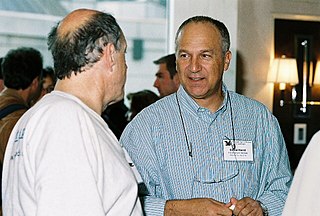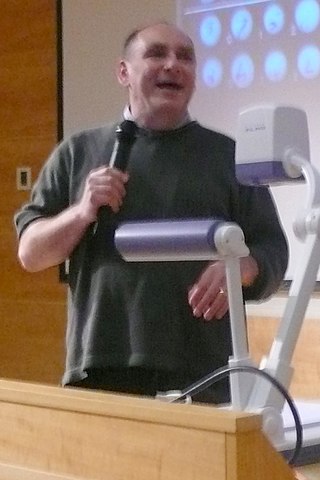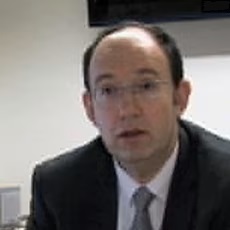Related Research Articles
Peter Thomas Kirstein was a British computer scientist who played a role in the creation of the Internet. He made the first internetworking connection on the ARPANET in 1973, by providing a link to British academic networks, and was instrumental in defining and implementing TCP/IP alongside Vint Cerf and Bob Kahn.

David Harel is a computer scientist, currently serving as President of the Israel Academy of Sciences and Humanities. He has been on the faculty of the Weizmann Institute of Science in Israel since 1980, and holds the William Sussman Professorial Chair of Mathematics. Born in London, England, he was Dean of the Faculty of Mathematics and Computer Science at the institute for seven years.
Search-based software engineering (SBSE) applies metaheuristic search techniques such as genetic algorithms, simulated annealing and tabu search to software engineering problems. Many activities in software engineering can be stated as optimization problems. Optimization techniques of operations research such as linear programming or dynamic programming are often impractical for large scale software engineering problems because of their computational complexity or their assumptions on the problem structure. Researchers and practitioners use metaheuristic search techniques, which impose little assumptions on the problem structure, to find near-optimal or "good-enough" solutions.
Elaine Jessica Weyuker is an ACM Fellow, an IEEE Fellow, and an AT&T Fellow at Bell Labs for research in software metrics and testing as well as elected to the National Academy of Engineering. She is the author of over 130 papers in journals and refereed conference proceedings.
Mehdi Jazayeri is the founding dean of the faculty of informatics of the Università della Svizzera italiana in Lugano, Switzerland, and author of several textbooks on computer software. He was awarded the Influential Educator Award in 2012 by the ACM SIGSOFT.

Jonathan Andrew Crowcroft is the Marconi Professor of Communications Systems in the Department of Computer Science and Technology, University of Cambridge, a Visiting Professor at the Department of Computing at Imperial College London, and the chair of the programme committee at the Alan Turing Institute.

Mark James Handley is Professor of Networked Systems in the Department of Computer Science of University College London since 2003, where he leads the Networks Research Group.
Carlo Ghezzi is an emeritus professor and former chair of software engineering at the Politecnico di Milano, Italy, and an adjunct professor at the Università della Svizzera italiana (USI), Switzerland. At the Politecnico, he has been the Rector's Delegate for research, department chair, head of the PhD program, and member of the academic senate and of the board of governors of Politecnico.

Peter William O'Hearn, formerly a research scientist at Meta, is a Distinguished Engineer at Lacework and a Professor of Computer science at University College London (UCL). He has made significant contributions to formal methods for program correctness. In recent years these advances have been employed in developing industrial software tools that conduct automated analysis of large industrial codebases.

Sir Anthony Charles Wiener Finkelstein is a British engineer and computer scientist. He is the President of City, University of London. He was Chief Scientific Adviser for National Security to HM Government until 2021.
Metamorphic testing (MT) is a property-based software testing technique, which can be an effective approach for addressing the test oracle problem and test case generation problem. The test oracle problem is the difficulty of determining the expected outcomes of selected test cases or to determine whether the actual outputs agree with the expected outcomes.
Mary Lou Ehnot Soffa is an American computer scientist noted for her research on compilers, program optimization, system software and system engineering.
Lori A. Clarke is an American computer scientist noted for her research on software engineering.
Lori L. Pollock is an American Computer Scientist noted for her research on software analysis and testing, green software engineering and compiler optimization.
Alexander L. Wolf is an American computer scientist known for his research in software engineering, distributed systems, and computer networking. He is credited, along with his collaborators, with introducing the modern study of software architecture, content-based publish/subscribe messaging, content-based networking, automated process discovery, and the software deployment lifecycle. Wolf's 1985 Ph.D. dissertation developed language features for expressing a module's import/export specifications and the notion of multiple interfaces for a type, both of which are now common in modern computer programming languages.
Bashar Ahmad Nuseibeh, is a professor of computing at The Open University in the United Kingdom, a professor of software engineering at the University of Limerick in Ireland, and chief scientist of Lero, the Irish Software Research Centre. He is also an honorary professor at University College London (UCL) and the National Institute of Informatics (NII), Japan.
EvoSuite is a tool that automatically generates unit tests for Java software. EvoSuite uses an evolutionary algorithm to generate JUnit tests. EvoSuite can be run from the command line, and it also has plugins to integrate it in Maven, IntelliJ and Eclipse. EvoSuite has been used on more than a hundred open-source software and several industrial systems, finding thousands of potential bugs.

Grigore Roșu is a computer science professor at the University of Illinois at Urbana-Champaign and a researcher in the Information Trust Institute. He is known for his contributions in runtime verification, the K framework, matching logic, and automated coinduction.

Yannis Smaragdakis is a Greek-American software engineer, computer programmer, and researcher. He is a professor in the Department of Informatics and Telecommunications at the University of Athens. He is the author of more than 130 research articles on a variety of topics, including program analysis, declarative languages, program generators, language design, and concurrency. He is best known for work in program generation and program analysis and the Doop framework.
Gregg Evan Rothermel is an American computer scientist, software engineer and academic born in March 1959 living in Apex, North Carolina. He is Professor and Head of the Department of Computer Science at North Carolina State University.
References
- 1 2 "Mark Harman: Award Recipient". www.computer.org. IEEE Computer Society . Retrieved 23 February 2019.
- 1 2 "Outstanding Research Award". SIGSOFT . Association for Computing Machinery . Retrieved 29 September 2021.
- 1 2 "Spotlight session with Mark Harman". Facebook Research. 30 May 2019. Retrieved 20 August 2020.
- ↑ "Mark Harman". UK: University College London.
- ↑ "Centre for Research on Evolution Search and Testing". UK: University College London . Retrieved 29 November 2018.
- 1 2 Mark Harman, LinkedIn.
- ↑ Mark Harman home page Archived 2007-12-11 at the Wayback Machine , Brunel University, UK.
- ↑ "Q&A With Facebook Engineer Mark Harman". Forbes . 10 February 2019.
- ↑ "Facebook TAV Symposium". Facebook . Retrieved 29 November 2018.
- ↑ Mark Harman at DBLP Bibliography Server
- ↑ Mark Harman's publications Archived 2010-05-12 at the Wayback Machine , King's College London, UK.
- ↑ Mark Harman publications indexed by Google Scholar . Retrieved 29 November 2018.
- ↑ Harman, M.; Jones, B. F. (2001). "Search-based software engineering". Information & Software Technology . 43 (14): 833–839. doi:10.1016/S0950-5849(01)00189-6.
- ↑ Mao, Ke (2 May 2018), Sapienz: Intelligent automated software testing at scale, Facebook , retrieved 30 November 2018
- ↑ Dotson, Kyt (2 May 2018). "With Sapienz, Facebook makes automated software testing smarter". silisonANGLE. Retrieved 30 November 2018.
- ↑ Vincent, James (23 July 2020). "Facebook is simulating users' bad behavior using AI". The Verge. Retrieved 20 August 2020.
- ↑ "WES: Agent-based User Interaction Simulation on Real Infrastructure". Facebook Research. Retrieved 20 August 2020.